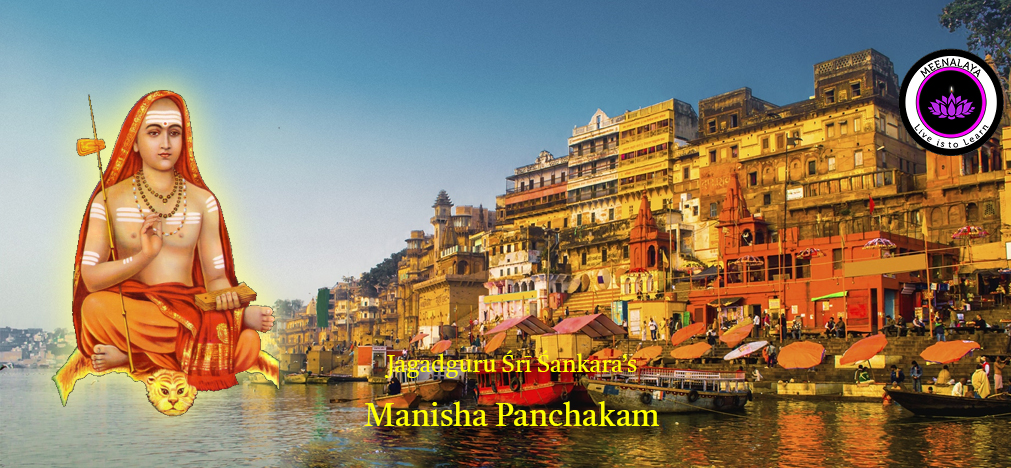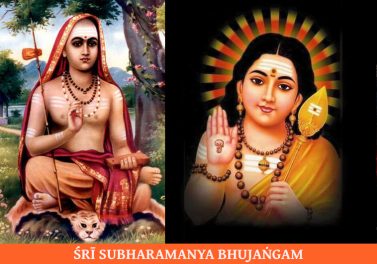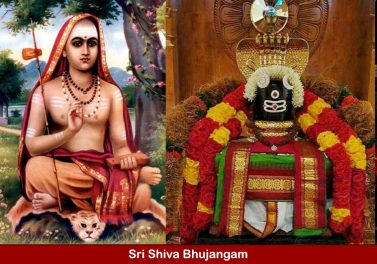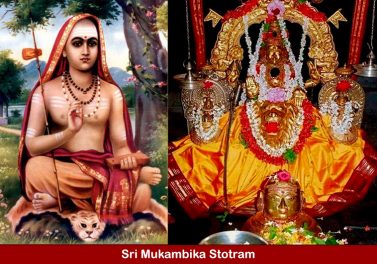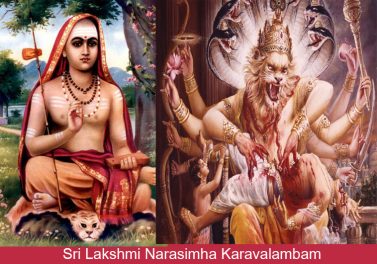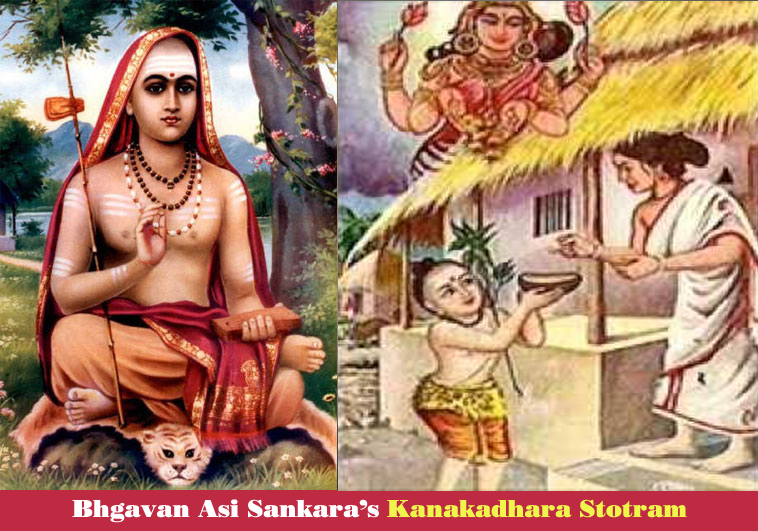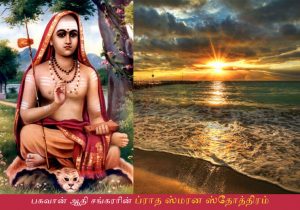Adi Sankara’s Manisha
Jagadguru Adi Sankara is the greatest master in wrapping the ocean of knowledge in the seeds of words. In the Manisha Panchakam, he brings the purport of ‘maha-vaakyas’ or ‘the most significant sentences’ of Upanisads for our understanding. The Upanisads articulate the oneness of the universe through various examples and arguments for guiding us along to the Self realization; the Upanisads often pack salient aspects of wisdom in few words of a sentence that is good enough to trigger immense contemplation and ultimate transformation within. Such sentences are known as ‘maha- vaakayas’.
We do come across such maha-vaakayas in our personal and worldly encounters.
For example, the phrase ‘Vande matharam’ was good enough to trigger the desire for independence among the Indians during the days of colonization. The assertion, ‘You are my Son’ by Kunti was good enough for Karnan in the epic Mahabharata to completely transform his life. Sri Hanuman’s words ‘Seen Mother Seetha’ were good enough for Sri Rama in His determination to pursue the war with Ravana.
In the life Sri Sadashiva Brahmendra, one of the greatest Seers of India, was also a life changing sentence. When the Guru asked him once to ‘Refrain from speech’, Sadashiva Brahmendra gave-up speaking completely and entered into an eternal silent contemplation.
So was Bhagavan Ramana. At the young age, when witnessed the demise of a relative at home, Ramana was told ‘Death is when the one leaves the body’. That sentence has changed his life as Ramana began to question the temporal nature of the body and contemplate on the question ‘ who am I’. Rest was history.
So is the statement of equation E=MC2 by Albert Einstein, one of the greatest scientists, which has transformed many aspects of scientific and social pursuits in the history of mankind.
As Upanisads deal with Self-inquiry the maha-vaakyas of Upanisads are capable of triggering personal transformation of the highest order, applicable to each of us, and to the entire humanity. The maha-vaakyas of Upanisads are usually simple in their structure, easier to remember, yet immensely pregnant with wisdom. Among these, ‘tatvamasi’ (Thou that art), ‘aham brahmasi’ (I am brahmam), ‘pragyanam brahma’ (consciousness is Brahmam), ‘ayamaatma brahma’ (Atman is Brahmam) are the most important mahaa-vaakyas.
What do these statements convey? In a nut-shell, these are the most profound equations that elevate us, the Self, to the level of godliness, the Universal-Self.
The Self or the Atman embodied in each body is none other than the Universal-Self or Paramaatman that is embodied in the entire universe. It is astounding. Although incomprehensible to begin with, when contemplated, such maha-vaakyaas are extremely revealing and positively uplifting.
Generally when we say ‘this is equal to that’, we infer at least three things. Firstly there are two objects namely ‘this’ and ‘that’; secondly, there appears to be some differences between these two objects because if there is no apparent difference, we would have simply identified them as ‘same’, but not as ‘equal’. Finally, although there appears to be differences between these two, these differences are not real as they become equal.
When we consider these maha-vaakayas as the equations for revealing the oneness of the universe, we thereby infer the following. There is Jeevaatman, the Atman enshrined in the individual bodies; there is Paramaatman that enlivens in all universes as the eternal witness. There are apparent differences between these two. Yet when we analyze using the ‘kaarana’ and ‘kaariya dhristi’, these differences disappear, thus proving the equation.
The main purport of Upanisads is to explore these equations of the highest order providing ample evidences of their truth. Adi Sankara’s Manisha Panchakam is a master piece to bring forth the knowledge of these maha-vaakayas.
To obtain knowledge, especially in spiritual inquiry, there are four principal ways.
Firstly, there is pratyaksham or knowledge realized through five senses. But the knowledge about the Self is not possible through the use of five senses.
Next there is anumaanam or inference through reasoning which enables for the discrimination of right from wrong, truth from untruth; yet intellectual reasoning alone is not sufficient to indicate the knowledge of Atman. Also reasoning is possible only when there is a concept or the object of study that is already made available through some authority.
The aagamam or the authority of Vedas is therefore the basis for defining the context of the ‘Self’, for further reasoning and contemplation. As the Upanisads are the knowledge revealed by the Seers, we need to have absolute faith in their authority in order to understand and realize. If we have no faith in the Upanisads, then indeed we have no other means of knowing about the Self. We may have to defer our pursuit of Self-Inquiry, until such faith is truly return to our hearts.
Finally is the swanubhavam or the direct experience. It is epiphany or spontaneous revelation. This is the ultimate and the only way to attain Self-realization. Such swanubhavam can be acquired spontaneously either because of long contemplation on the knowledge acquired by other means, or in a flash by the grace of the divinity itself. Self-realization is possible only through swanubhavam and it is aided by the long and faithful contemplation and the divine grace.
So absolute and unreserved faith in these maha-vaakayas is mandated for reasoning and sincere contemplation. That is the way to progress towards Self-inquiry and the prospects of the spontaneous swanubhavam.
In the Manisha Panchakam, although the context of Stranger’s question appears as the result of social injustice, it goes beyond the individual relationship in the society to the eternal understanding of individual nature itself with that of God. That is why Sankara chose to answer these questions by bringing the gems of Vedanta Upanisads into this beautifully woven garland of five verses.
The first verse of Manisha Panchakam analyzes the Jeevaatman and concludes that it is none other than Brahmam. This is known as ‘Jeeva Brahma Vedanta Rahasyam’ or the secret of Jeevaatman and Brahmam.
In the second verse, Sankara analyzes the Paramaatman (the Atman enshrined in all living bodies and all worlds) and declares that only the Brahmam appears as the Jeevaatman in the individual bodies.
Thus within the first two verses, the complete essence of Upanisad, the identification and unification of Jeevaatman and Paramaatman, is delivered for our sweet consumption.
In the third verse, out of compassion, the ever graceful Adi Sankara, offers the methods for acquiring such wisdom and its benefits to the humanity.
In the fourth verse, Adi Sankara further shows that the Atman is the Sat (ultimate noumenal), Chit (infinite- knowledge) and Ananda (absolute-bliss); it is the nearest and the dearest yet remains beyond cognition.
Finally, in the fifth verse, Adi Sankara reveals that the ultimate benefit of Self-realization is the taste of absolute-bliss, which is filled within us as a serene ocean; Those who knows this and contemplates on this wisdom will ultimately merge into that ocean of absolute-bliss. At that stage, he is no more a knower of Brahmam but the Brahmam itself.
At the end of each verse, Sankara declares as his ‘Manisha’ that anyone who has this knowledge and remains firmly in that wisdom, he alone, irrespective of his stature in the society, is the preceptor and guru, worthy of worship even by gods.
These verses are the beacons of Upanishads. Its words are the seeds of Advaita wisdom. When One studies these verses with sincere quest, and seeks earnestly, an able teacher will soon be known, to take the One, to greater heights of wisdom.
The deepest and intrinsic meanings of these verses require careful understanding and guidance of competent teacher. So, this feeble interpretation of mine is like showing the light of incense-stick to the blazing Sun. Yet, if this text can trigger any reader towards in-depth study, the work had its rewards.

